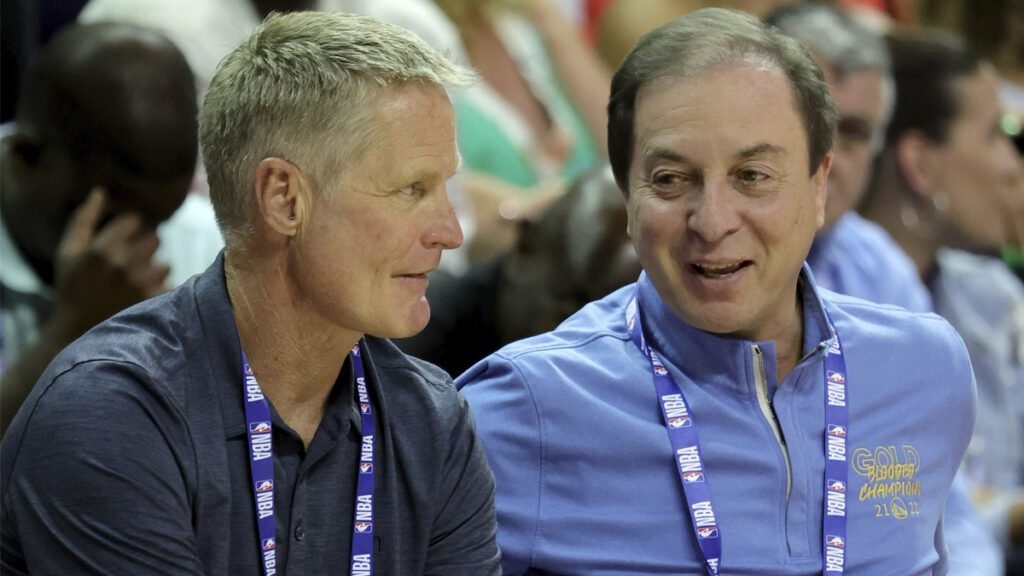How the Warriors front office gained wisdom after a questionable trade originally appeared on NBC Sports Bay Area
The thinking around the NBA is that the Warriors, well aware that they are not among the top teams in the Western Conference, are still looking for a move that could put them there.
But there is a catch.
Golden State’s front office, with general manager Mike Dunleavy under the authority of CEO Joe Lacob, is considerably more deliberate than those days past when it thirsted for relevance. Or desperate to walk into the wilderness.
Multiple league sources believe the more prudent approach is a return to a hard lesson learned 46 months ago.
Back to November 2020 acquisition of Kelly Oubre Jr.
The Warriors left an NBA-worst 15-50 season that got them in the draft lottery. There were legitimate reasons for the steep descent. Kevin Durant’s offseason departure. The absence Klay Thompson, rehabilitating a torn left ACL. An early-season injury that limited Stephen Curry to five games. The season that followed a fifth straight trip to the NBA Finals was reduced to ashes by Halloween.
The front office was determined to avoid another disaster and felt good about the revamped roster. Curry and Thompson were healthy. Andrew Wiggins would play alongside both for the first time. First-round draft pick James Wiseman could play a little and learn a lot.
Hours before the Warriors drafted Wiseman, Thompson continued ruptured right Achilles tendon during training. A cloud of gloom has enveloped the franchise. Rather than risk another forgettable season, the Warriors pivoted to Plan B. To Oubre.
Oubre is a talented wing who can be effective on both ends. He would essentially replace Thompson, a five-time NBA All-Star and elite shooter who was voted to the 2019 All-Defensive team. Problem addressed, if not resolved.
Lacob, according to league sources, was a loud voice – the “driving force”, according to one – in favor of trading for Oubre. So much so that it didn’t matter that it would double Golden State’s luxury tax. Oubre’s one season cost the Warriors more than $80 million in salary and luxury taxes.
Although the Warriors usually like to make collective decisions, that was not the case with Oubre, according to sources. From Lacob down through various levels of power, including then-GM Bob Myers and the coaching staff, there were pockets of dissent. The biggest question seemed to be whether Oubre’s skills and attitude would complement the rest of the roster.
The Oubre trade was made on November 22, 2020, with Golden State giving the Oklahoma City Thunder multiple draft picks, all of which ended up in the second round.
What followed was a season of misery; Wiseman was the opening night starting center, a move coach Steve Kerr later regretted. There was inconsistency from both Oubre and the team. The Warriors were 33–33 before closing the season with a six-game winning streak snapped while Oubre was sidelined with a wrist injury.
They landed in the league’s inaugural NBA Play-In Tournament, where losses to the Los Angeles Lakers and Memphis Grizzlies sent them into a summer admitting their expensive gamble was a failure. A move that smacked of desperation failed, and the concerns of dissenting voices came true.
Up until that point, unbridled ambition had been the central component of every major move made under the ownership group led by Lacob. He was behind the first big splash, the July 2010 trade for David Lee, who became an All-Star that season. The CEO recognized the value in Andre Iguodala and in 2013 acquired him in a multi-team deal.
At the top of Lacob’s summer 2016 to-do list — quite possibly the only line — was recruiting Durant.
In the eight years since Durant left, the Oubre deal is the only individual move made under the theory that it alone would be enough to keep the Warriors among the contenders. Every move since then, including the addition of Chris Paul last summer, has been made to supplement the roster rather than expand its core.
Much of this approach is related to the Oubre experience. The Warriors no longer want to jeopardize their bottom line, sacrifice a bunch of draft picks or disrupt their roster for anyone who doesn’t value consensus.
Brandon Ingram, to cite an example, is among those who, according to sources, do not meet that level. There is enough upside/downside that any chance of him coming to Golden State is minuscule.
The Warriors’ failure to add an elite player this summer is partly because they are being more cautious. The benefits of adding Paul George or Lauri Markkanen far outweighed the potential for disaster. There was relative agreement between all parties involved, including core players Draymond Green and Curry.
Forced to adjust, the front office compromised. The additions of Kyle Anderson, Buddy Hield and De’Anthony Melton are well below seismic but, combined, are on the upper end of supplemental. All three projects to get regular minutes.
Although the Warriors did not make a sexual move, the belief around the NBA is the same as the wishes of Dub Nation. That they will make a significant deal before the season or, more likely, nearing the February trade deadline.
If such an agreement is made, it is because an internal debate has tilted strongly towards the positive.
